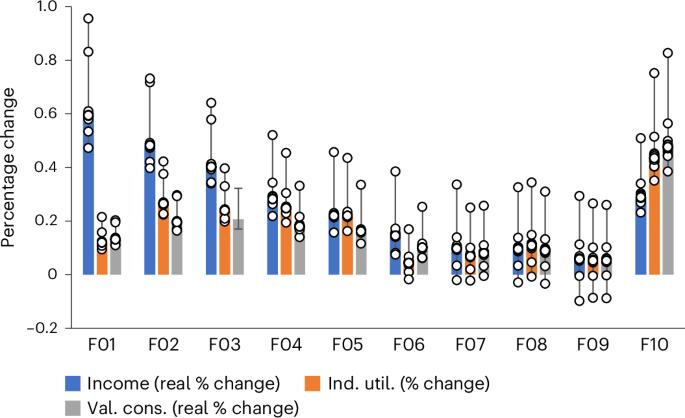Contribution of double-cropped maize ethanol in Brazil to sustainable development
IF 27.1
1区 环境科学与生态学
Q1 ENVIRONMENTAL SCIENCES
引用次数: 0
Abstract
Sustainable energy and food production can include double-cropping where two crops are produced sequentially on land required for one crop to maximize resource use. In Brazil, this system involves maize being planted as a second crop following soybean to generate ethanol, thus allowing for combined food–energy production. However, the impacts of such production systems on several sustainable development goals (SDG) and associated indirect land-use changes have not yet fully been explored. We evaluate the fast-expanding food–energy system of double-cropped maize ethanol in the Central-West region of Brazil with respect to SDG impacts, combining life-cycle environmental and computable general equilibrium socio-economic models. We find that this system provides renewable and affordable energy (5 billion litres of ethanol, 600 GWh of electrical power) and feed (4 million tons of distillers dried grains), reduces greenhouse gas emissions (9.3 million to 13.2 million tCO2e), saves land (160,000 ha), boosts regional income and consumption, improves food security and benefits ecosystems and human health. Underlying drivers associated with this were the integration of feedstock supply into existing practices and the use of eucalyptus chips to provide process energy. The sustainability of this production system is improved further by carbon capture and storage. Combined food–energy production systems can help improve resource-use efficiency, but the extent to which such systems contribute to sustainable development has not yet been fully explored. This study evaluates this system in double-cropped maize ethanol production in Brazil.

巴西双季玉米乙醇对可持续发展的贡献
可持续能源和粮食生产可包括双季种植,即在种植一种作物所需的土地上依次生产两种作物,以最大限度地利用资源。在巴西,这种系统包括在大豆之后种植玉米作为第二种作物,以生产乙醇,从而实现粮食和能源的综合生产。然而,这种生产系统对几个可持续发展目标(SDG)的影响以及相关的间接土地利用变化尚未得到充分探讨。我们结合生命周期环境模型和可计算一般均衡社会经济模型,评估了巴西中西部地区快速扩张的双季玉米乙醇粮食能源系统对可持续发展目标的影响。我们发现,该系统提供了可再生且负担得起的能源(50 亿升乙醇、6 亿千瓦时电力)和饲料(400 万吨蒸馏干粮),减少了温室气体排放(930 万至 1320 万吨二氧化碳当量),节约了土地(16 万公顷),提高了地区收入和消费,改善了粮食安全,并有利于生态系统和人类健康。与此相关的基本驱动因素是将原料供应纳入现有实践,以及使用桉树木片提供加工能源。碳捕获和碳存储进一步提高了这一生产系统的可持续性。粮食-能源联合生产系统有助于提高资源利用效率,但这种系统对可持续发展的贡献程度尚未得到充分探讨。本研究对巴西双季玉米乙醇生产中的这一系统进行了评估。
本文章由计算机程序翻译,如有差异,请以英文原文为准。
求助全文
约1分钟内获得全文
求助全文
来源期刊

Nature Sustainability
Energy-Renewable Energy, Sustainability and the Environment
CiteScore
41.90
自引率
1.10%
发文量
159
期刊介绍:
Nature Sustainability aims to facilitate cross-disciplinary dialogues and bring together research fields that contribute to understanding how we organize our lives in a finite world and the impacts of our actions.
Nature Sustainability will not only publish fundamental research but also significant investigations into policies and solutions for ensuring human well-being now and in the future.Its ultimate goal is to address the greatest challenges of our time.
 求助内容:
求助内容: 应助结果提醒方式:
应助结果提醒方式:


